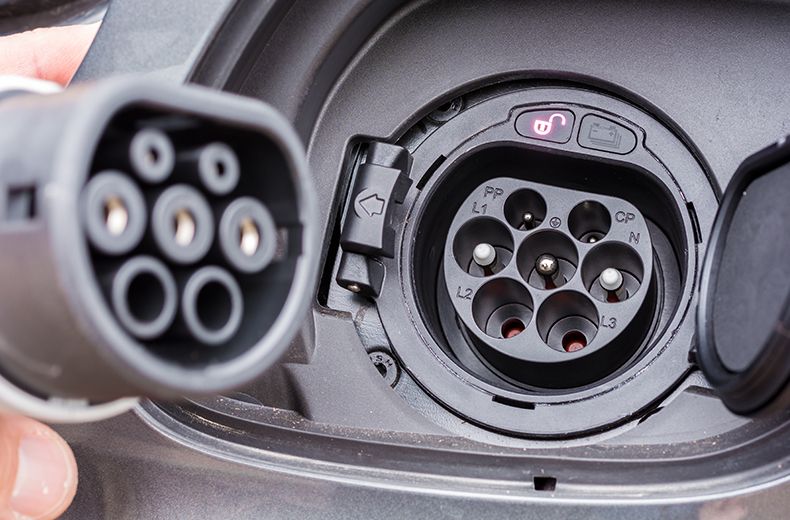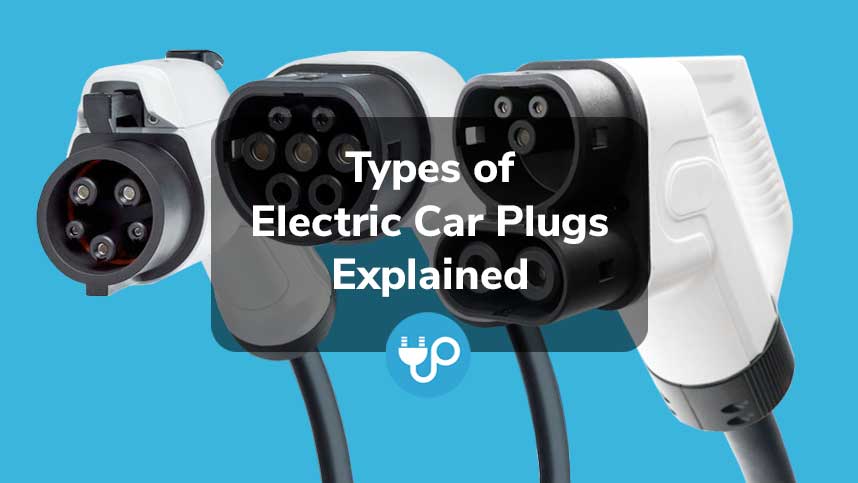The AC chargers for EVs are level 1 and level 2 chargers, where the AC current coming from the charging station is converted to DC current at the EV's onboard charger. The domestic AC supply has a maximum power of 7kW.All mass-produced electric vehicles today include a 110-volt-compatible (Level 1) charging unit which is able to be plugged into any standard 110v household outlet.Your EV will usually come with a plug that lets you charge from a standard home electric socket. This is very slow compared to other charging methods, so it's only really useful for occasional or emergency use.
What kind of power is needed to charge an electric car : How much electricity does an electric car use Generally, electric cars charged at home use about 7,200 watts (W) of electricity, which can vary depending on the mode and home charger. Most electric car chargers use between 32 and 40 amps and connect to a 240-volt outlet in your home's breaker box.
What type of charger does Tesla use
NACS, or the North American Charging Standard, is Tesla's charging standard for electric vehicles and the most common charging standard in North America. The Mobile Connector and Wall Connector have NACS plugs and only work with Tesla vehicles.
Can any electric car use any charger : You can charge your electric car at any charging station that has a compatible plug or socket to your charging cable.
Can you plug an electric car into a regular outlet that is 240 volts Yes! This is known as Level 2 charging. Are electric car chargers universal Most EVs in North America currently use the same connectors for Level 1 and Level 2 charging, so the chargers are generally universal. Differences appear for EVs equipped with DC fast charging based on the manufacturer and region.
What kind of charger does a Tesla use
There are two main types of Tesla chargers: Superchargers and Destination Chargers. Superchargers are the fastest charging option for Teslas, whereas Destination Chargers are most useful for overnight chargers or when you don't need a substantial amount of energy added to your battery quickly.SAE J1772 EV plug
Level 1 and 2 Connectors
The most common connector is the SAE J1772 EV plug. All electric cars in Canada and in the US can charge using this plug, even Tesla cars as they come with an adapter.Most electric vehicles can cover up to 100 kilometres with 15 kWh. Their low energy loss makes means that they are not very energy intensive. While petrol or diesel engines convert a maximum of 35 % of this energy into driving force, an electric car reaches 90 % and more. You can charge your car from any standard 240v outlet that you have in your home with no trouble. If you don't have a drive or garage and you're parking your car on the street, you might choose to put some protective gear over the wire of your extension cable.
Do you need special charger for Tesla : You do not need to install a Wall Connector for home charging. You can use the Mobile Connector to plug into a standard household outlet for 2-3 mph of charge or, if you have an existing 240 V outlet that your installer approves for charging use, you can get up to 30 mph of charge.
What is the most common EV charger type : The most common connector is the SAE J1772 EV plug. All electric cars in Canada and in the US can charge using this plug, even Tesla cars as they come with an adapter.
Can you plug an electric car into a normal plug
It's perfectly possible to charge your electric car using a conventional 3-pin plug with an EVSE1 cable (also called a granny cable) and domestic socket, although this method of charging can be very slow. A domestic 2.4kW socket can take over 24hrs to charge your EV battery. To fully charge an electric car at home it typically costs around £6. To charge an EV to 80% at a public rapid charger (the level you normally would here) it usually costs between £7 and £10. Naturally, this varies depending on the location, tariff, energy cost, battery capacity, charging speed and charge level.Depending on the battery technology in the EV, it generally takes 8 to 24 hours to completely charge a battery (ideal for overnight home charging). Charging equipment provides charging through a 220 volt (V), alternating-current (AC) plug and requires a dedicated circuit.
How long does it take to charge an electric car with a 240V outlet : Home Charging: For 220V/240V outlet home charging, you can expect a 100% charge in 6 hours and 5 minutes.
Antwort What kind of charger does an electric car use? Weitere Antworten – What type of charger do electric cars use
AC Chargers for Electric Vehicles
The AC chargers for EVs are level 1 and level 2 chargers, where the AC current coming from the charging station is converted to DC current at the EV's onboard charger. The domestic AC supply has a maximum power of 7kW.All mass-produced electric vehicles today include a 110-volt-compatible (Level 1) charging unit which is able to be plugged into any standard 110v household outlet.Your EV will usually come with a plug that lets you charge from a standard home electric socket. This is very slow compared to other charging methods, so it's only really useful for occasional or emergency use.

What kind of power is needed to charge an electric car : How much electricity does an electric car use Generally, electric cars charged at home use about 7,200 watts (W) of electricity, which can vary depending on the mode and home charger. Most electric car chargers use between 32 and 40 amps and connect to a 240-volt outlet in your home's breaker box.
What type of charger does Tesla use
NACS, or the North American Charging Standard, is Tesla's charging standard for electric vehicles and the most common charging standard in North America. The Mobile Connector and Wall Connector have NACS plugs and only work with Tesla vehicles.
Can any electric car use any charger : You can charge your electric car at any charging station that has a compatible plug or socket to your charging cable.
Can you plug an electric car into a regular outlet that is 240 volts Yes! This is known as Level 2 charging.

Are electric car chargers universal Most EVs in North America currently use the same connectors for Level 1 and Level 2 charging, so the chargers are generally universal. Differences appear for EVs equipped with DC fast charging based on the manufacturer and region.
What kind of charger does a Tesla use
There are two main types of Tesla chargers: Superchargers and Destination Chargers. Superchargers are the fastest charging option for Teslas, whereas Destination Chargers are most useful for overnight chargers or when you don't need a substantial amount of energy added to your battery quickly.SAE J1772 EV plug
Level 1 and 2 Connectors
The most common connector is the SAE J1772 EV plug. All electric cars in Canada and in the US can charge using this plug, even Tesla cars as they come with an adapter.Most electric vehicles can cover up to 100 kilometres with 15 kWh. Their low energy loss makes means that they are not very energy intensive. While petrol or diesel engines convert a maximum of 35 % of this energy into driving force, an electric car reaches 90 % and more.

You can charge your car from any standard 240v outlet that you have in your home with no trouble. If you don't have a drive or garage and you're parking your car on the street, you might choose to put some protective gear over the wire of your extension cable.
Do you need special charger for Tesla : You do not need to install a Wall Connector for home charging. You can use the Mobile Connector to plug into a standard household outlet for 2-3 mph of charge or, if you have an existing 240 V outlet that your installer approves for charging use, you can get up to 30 mph of charge.
What is the most common EV charger type : The most common connector is the SAE J1772 EV plug. All electric cars in Canada and in the US can charge using this plug, even Tesla cars as they come with an adapter.
Can you plug an electric car into a normal plug
It's perfectly possible to charge your electric car using a conventional 3-pin plug with an EVSE1 cable (also called a granny cable) and domestic socket, although this method of charging can be very slow. A domestic 2.4kW socket can take over 24hrs to charge your EV battery.

To fully charge an electric car at home it typically costs around £6. To charge an EV to 80% at a public rapid charger (the level you normally would here) it usually costs between £7 and £10. Naturally, this varies depending on the location, tariff, energy cost, battery capacity, charging speed and charge level.Depending on the battery technology in the EV, it generally takes 8 to 24 hours to completely charge a battery (ideal for overnight home charging). Charging equipment provides charging through a 220 volt (V), alternating-current (AC) plug and requires a dedicated circuit.
How long does it take to charge an electric car with a 240V outlet : Home Charging: For 220V/240V outlet home charging, you can expect a 100% charge in 6 hours and 5 minutes.